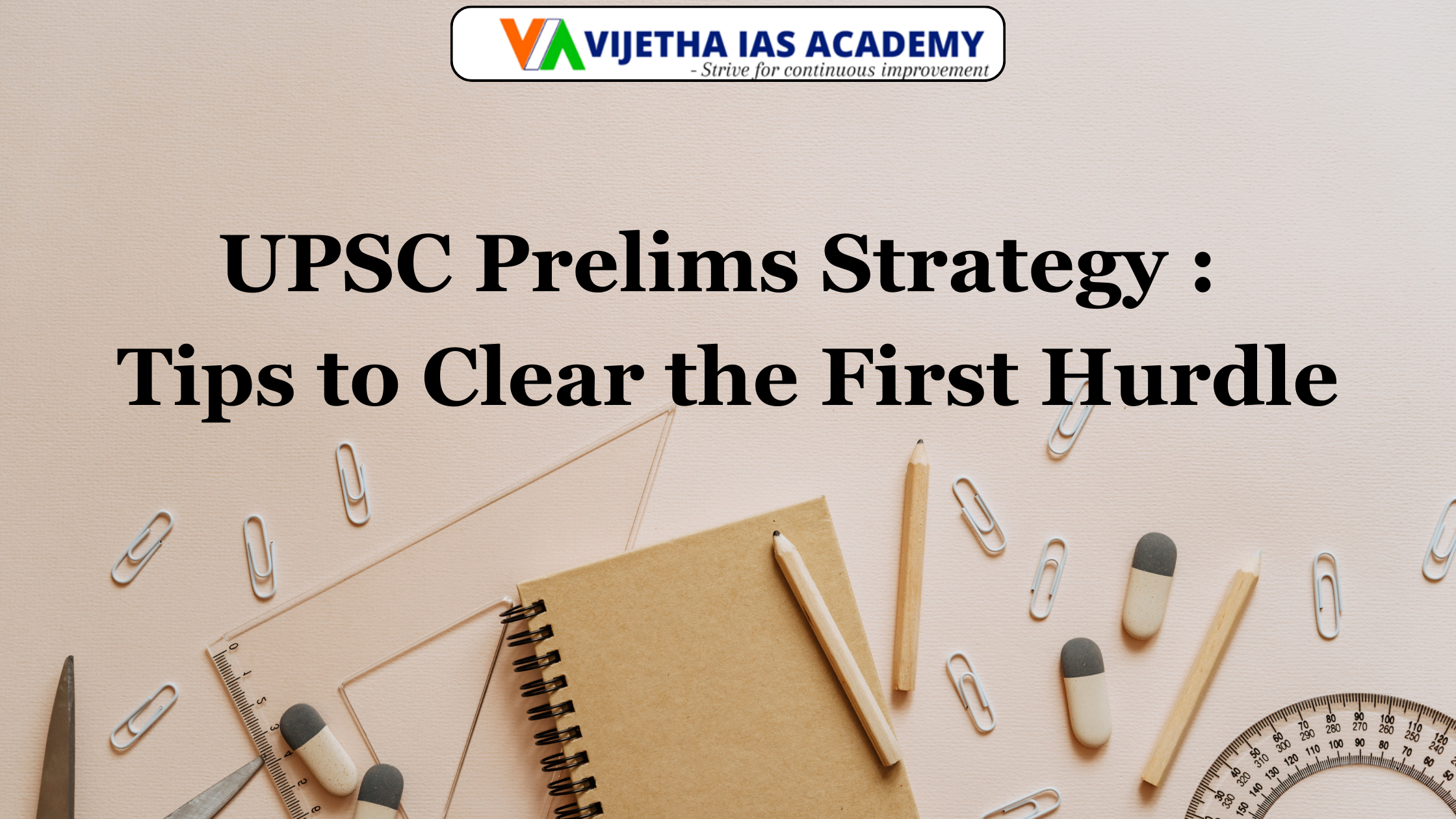
UPSC Prelims Strategy: Tips to Clear the First Hurdle
The UPSC Civil Services Preliminary Examination, commonly known as the UPSC Prelims, is the first major hurdle that aspirants must clear to progress to the Mains exam. This stage is critical as it filters out a significant number of candidates. Therefore, having a robust strategy is essential for success. In this blog post, we will delve into effective tips and strategies to help you clear the UPSC Prelims.
Understand the UPSC Prelims Structure
The Prelims exam consists of two papers:
- General Studies Paper I: This paper covers a wide range of subjects including History, Geography, Polity, Economy, Environment, Science and Technology, and Current Affairs.
- General Studies Paper II (CSAT): This is an aptitude test that assesses your comprehension, logical reasoning, analytical ability, and basic numeracy skills. It is qualifying in nature, requiring a minimum of 33% to pass.
Both papers are objective type with multiple-choice questions. Understanding the structure and the weightage of each section is crucial for effective preparation.
Tips to Clear the First Hurdle
1. Start Early and Plan Effectively
Begin your preparation at least one year in advance. Create a realistic study plan that covers the entire syllabus systematically. Allocate more time to subjects you find challenging and ensure you stick to your schedule diligently.
2. Focus on NCERT Books
NCERT books from classes VI to XII are fundamental to building a strong foundation. They provide a clear and concise understanding of basic concepts. Make sure to thoroughly read and revise these books multiple times.
3. Refer to Standard Books
For a deeper understanding, refer to standard books recommended by experts and successful candidates. Here are some must-read books:
- Polity: Indian Polity by M. Laxmikanth
- History: India’s Struggle for Independence by Bipan Chandra, A Brief History of Modern India by Spectrum
- Geography: Certificate Physical and Human Geography by G.C. Leong, Oxford School Atlas
- Economy: Indian Economy by Ramesh Singh
- Environment: Environment by Shankar IAS
4. Stay Updated with Current Affairs
Current affairs play a significant role in the Prelims. Develop a habit of reading newspapers like The Hindu or Indian Express daily. Make notes of important events, government schemes, and international relations. Additionally, refer to monthly magazines like Yojana and Kurukshetra for in-depth analysis.
5. Practice Previous Year Papers
Solving previous years’ question papers gives you an insight into the exam pattern and the type of questions asked. It helps you identify important topics and assess your preparation level. Aim to solve at least the past ten years' papers.
6. Take Mock Tests Regularly
Regular mock tests are crucial for assessing your preparation and improving your time management skills. They help in identifying your strengths and weaknesses, allowing you to focus on areas that need improvement. Join a reliable test series from reputed institutes like Vijetha IAS Academy to get a real exam-like experience and detailed feedback.
7. Revise Consistently
Revision is the key to retaining information. Make it a habit to revise regularly. Create short notes for quick revision in the final days leading up to the exam. Focus on revising important facts, dates, and events.
8. Develop a Strategy for CSAT
Although CSAT is qualifying in nature, it should not be neglected. Practice regularly to improve your comprehension, logical reasoning, and numerical ability. Refer to standard books like Verbal and Non-Verbal Reasoning by R.S. Aggarwal and solve previous years’ CSAT papers.
9. Manage Your Time Effectively
Time management is crucial during both preparation and the actual exam. Allocate specific time slots for each subject and stick to your study schedule. During the exam, manage your time efficiently by not spending too much time on any single question.
10. Stay Healthy and Positive
Maintaining good health and a positive mindset is essential for effective preparation. Ensure you get adequate sleep, exercise regularly, and follow a balanced diet. Practice meditation or yoga to keep stress at bay and stay focused.
Expert Guidance
Joining a reputed coaching institute can provide structured guidance and regular assessments. Vijetha IAS Academy is known for its comprehensive courses and experienced faculty. Their tailored programs, including Kishore Sir Anthropology, offer in-depth knowledge and valuable insights into the UPSC syllabus.
Importance of Anthropology as an Optional Subject
Anthropology is a popular optional subject among UPSC aspirants due to its scoring potential and relatively concise syllabus. Kishore Sir Anthropology at Vijetha IAS Academy is renowned for providing expert guidance and well-structured notes. His approach simplifies complex topics, making it easier for students to grasp and retain information.
Final Words of Encouragement
Clearing the UPSC Prelims is the first step towards achieving your dream of becoming a civil servant. With a well-structured strategy, disciplined study routine, and the right guidance, you can overcome this hurdle successfully. Remember, consistency and perseverance are key. Stay focused, keep revising, and believe in your abilities.
The journey to cracking the UPSC exam is challenging, but with determination and the right approach, you can achieve your goal. Leverage resources like Vijetha IAS Academy and expert guidance from Kishore Sir Anthropology to enhance your preparation and stay ahead in the competition.
